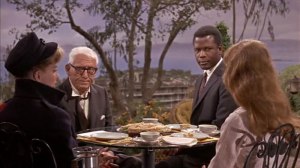As 23-year-old Joanna Drayton sits across from her mother and tells her she’s fallen in love and got engaged, you can see and feel the warmth growing in her mother’s heart. Her adoring eyes glisten as she listens to her daughter’s love story, no doubt remembering the feeling. It isn’t until Joanna mentions an important fact about her husband-to be, Dr. John Wayde Prentice, that he enters the room behind her. No need to mention the fact anymore, though, it’s evident on her mother’s surprised face — Dr. Prentice is African-American.
In the 1967 film, Guess Who’s Coming to Dinner, Matt and Christina Drayton, played by Spencer Tracy and Katharine Hepburn, are the upper-class, liberal parents of young Joanna, played by Katharine Houghton. Both parents despise the racial inequality in America during the time, but they struggle with their emotions once the reality hits close to — or rather, in — their home. Their struggle grows when they learn they only have one day to decide whether they approve or not, or the wedding is off, a limit put forth by Prentice but unknown to Joanna. Although interracial couples were much more of an issue at the time, the film is still relevant in today’s culture as we continue to struggle with the acceptance of interracial marriages.
Guess Who’s Coming to Dinner and the legal end of racial segregation happened almost half-a-century ago, in an era when John and Joanna were up against laws that actually forbid interracial marriage in 17 states at the time. That small-mindedness may not be officially sanctioned today, but it is unfortunately still with us; earlier this year, a Cheerios television ad depicting an interracial family caused so much controversy that the comments section on YouTube had to be disabled. Even back then the film scoffed at the stupidity of laws that tried to restrict even the most beautiful of human emotions. As Matt says to the betrothed himself: “You’re two wonderful people who happened to fall in love, and who happen to have a pigmentation problem.”
Director Stanley Kramer (Inherit the Wind, Judgement at Nuremberg) used the characters symbolically: the father represented what the mind thinks, the mother portrayed what the heart feels, and the children simply showed that the times, they were indeed a’changin’. Throughout the film, we see glimpses of the issues Joanna and John would have to face as an interracial couple. Christina’s employee, Hilary, for instance, is appalled at the “situation” poor Christina is in, and the black maid Tillie reduces John to a stereotype by accusing him of ill intentions in marrying a white woman.
Kramer let the writing of William Rose (The Ladykillers, The Man in the Sky) speak for itself, relying mostly on dialogue and only a minimal number of sets. The performances are master classes in acting, although Joanna can appear too naïve at times. While long film monologues can tire the audience, Sidney Poitier’s strong, assertive voice portraying John, and Tracy’s understanding, fatherly demeanor, make your heart pound one moment and melt the next. When John stands up to his own disapproving father and tells him he will not run his life, we all think back to the time when we wanted to tell our parents the same thing.
The classic film earned Hepburn an Academy Award for Best Actress, and is still a heart-warming tale due in part to its tragic history. Only 17 days after filming was completed, Tracy died of a heart attack, and only two days after his death, all racial segregation laws were struck down by the Supreme Court. To add to poetic tragedy, Hepburn has reportedly never seen the full film, as it was too painful to watch Tracy, her partner of 25 years both on and off-screen.
But it is the film’s cultural impact — seen through the lens of America’s racism — that transcends its time and makes it a classic from generation to generation. As John stands in front of his father at the end of his long monologue, his voice softening to a sympathetic tone, he looks lovingly into his eyes and says, “you think of yourself as a colored man, I think of myself as a man.” He was right on point, and even though we still struggle with seeing ourselves this way today, hopefully we’ll all be there soon.

You must be logged in to post a comment.